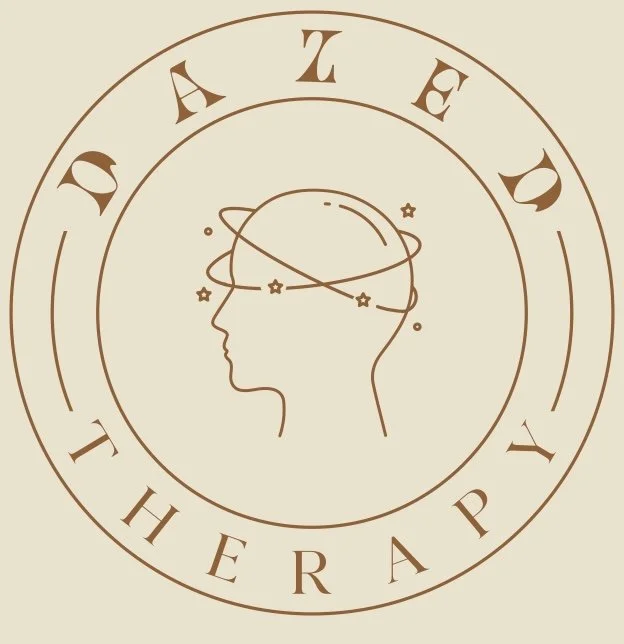
Cutting-edge Trauma Care is Here
EMDR Intensives
What is EMDR?
The fundamental premise of Eye Movement Desensitization and Reprocessing (EMDR) centers on activating the brain's innate capacity to process and recover from traumatic events. This process is facilitated through a systematic eight-phase protocol, wherein the therapist leads the client through targeted sets of eye movements, sounds, or taps while the client revisits distressing memories or experiences. EMDR operates under the principle that traumatic experiences can become "stuck" within the brain's memory networks, resulting in persistent distress and symptoms. Through the utilization of bilateral stimulation, while revisiting these memories, EMDR seeks to promote the adaptive processing of traumatic memories. This process enables the brain to integrate them into a more adaptive and less distressing narrative.
What is a 4-hour EMDR Intensives Session?
EMDR Intensive Therapy provides a chance to compress your therapeutic journey and advancements within a shorter timeframe. Unlike the weekly hour-long sessions that are typical in talk therapy, EMDR intensives are concentrated, lasting for 4 hours per day over 1-2 days. Throughout these intensives, we will concentrate on addressing one or two traumatic experiences from your past. Engaging in EMDR intensives can significantly enhance your talk therapy sessions, offering a potent supplement to your healing process.
What are the benefits of EMDR Intensives?
EMDR intensives are crafted to you an immersive and focused therapeutic journey, enabling you to explore deeply into the processing of upsetting or disturbing memories, emotions, and beliefs. EMDR intensives can be a stand-alone treatment or serve as an adjunct to your weekly talk therapy sessions. This approach can be especially advantageous if you:
Have directly or vicariously experienced severe trauma or multiple traumatic events.
Have been diagnosed with PTSD/ C-PTSD or other trauma-related disorders.
Have struggled to find relief from traditional talk therapy.
Are seeking rapid relief from distressing symptoms.
Prefer an accelerated approach to therapy.
Have limited availability for ongoing weekly therapy sessions.
You feel stuck in weekly therapy and want more, or you have a great therapist that you would like to continue to meet with who is not trained in EMDR.
Would like a cost-effective solution. Intensive sessions can save you money. You may be able to see progress in fewer sessions, which could reduce overall therapy costs.
As an EMDR-certified therapist, I've witnessed firsthand the positive outcomes it brings for my clients. Many individuals who have felt hindered by traditional therapy and medications have found that EMDR provides them with the breakthrough they've been seeking, offering them a pathway to find peace and reduce their distress levels.
However, through my experience, I've noticed that clients undergoing EMDR on a weekly or biweekly basis may require a longer timeframe to witness a decrease in their distress and symptoms. Often, I've felt that extending our sessions beyond the typical one-hour mark would be more beneficial, allowing for continued processing without the constraint of sessions ending.
While I enjoy working with clients on a weekly basis, accommodating new clients seeking help posed a challenge. Consequently, I've introduced intensives as a solution. My aim with EMDR intensives is to reach more clients and facilitate significant improvements in their lives within just a few days. This approach allows for more concentrated and continuous processing, which can lead to quicker and more profound results.
I’m Passionate About EMDR Intensives
The Investment Package
-
The potential benefits of EMDR include:
Reduction in distress
Improved self-esteem
Alleviation of PTSD symptoms
Reduced anxiety and depression
Improved physical health
Improved focus and concentration
Improved sleep quality
EMDR aids in guiding the brain to reintegrate the memory and relocate it to a more suitable area within the brain. It's the client's own brain that undertakes this process of memory reintegration and subsequent healing.
-
Reprocessing can bring up associated memories that are distressing. This is normal and will be included in the comprehensive treatment plan.
During reprocessing, you may experience physical sensations, and emotions, or retrieve images and sounds associated with the memory or event.
Reprocessing of the memory or event normally continues after the end of the formal therapy session. Other memories, flashbacks, feelings, and sensations may occur. You may have dreams associated with the memory. Frequently, the brain can process these additional memories without help, but arrangements for assistance will be made promptly if the client is unable to cope.
-
EMDR intensives aim to offer clients an immersive and concentrated therapeutic experience, enabling them to deeply explore the processing of troubling memories, emotions, and beliefs, without the time and financial resources required in traditional talk therapy.
-
Unfortunately, Insurance does not cover the costs of the intensive sessions, as intensives are not part of coverage plans and there are also no insurance codes for intensives for billing. Consequently, clients cannot submit claims to insurance themselves.
You may be able to submit a superbill to your insurance for the pre-intensive and post-intensive sessions.
-
You can visit these links to learn more:
-
I do not offer in-person sessions at this time. I exclusively offer virtual sessions via a HIPAA-compliant video conference platform.
-
Dazed Therapy typically offers one to two intensive slots a month.
-
Yes - a non-refundable deposit of 50% of the total cost of the intensive sessions is required for scheduling.
*Please note, that you can tentatively schedule your intensive after you have your intake session. However, these dates will only be held for 48 hours. After that, the deposit is required to confirm and schedule the dates for your intensive.
-
The objectives of an EMDR intensive can vary based on the specific needs and objectives of the individual undergoing treatment. However, some common objectives include:
Processing Traumatic Memories: The primary aim of EMDR is to assist individuals in processing and integrating distressing memories, particularly those associated with traumatic events. By revisiting and reprocessing these memories, individuals can find relief from associated distress and symptoms.
Alleviating Symptoms of PTSD: EMDR is frequently utilized to alleviate symptoms of post-traumatic stress disorder (PTSD), such as intrusive memories, flashbacks, nightmares, hypervigilance, and avoidance behaviors. The intensive format may facilitate more rapid symptom reduction compared to conventional therapy methods.
Addressing Negative Beliefs: EMDR seeks to identify and reprocess negative beliefs and self-perceptions that may have arisen as a result of traumatic experiences. By challenging and restructuring these beliefs, individuals can experience improvements in self-esteem, self-worth, and overall psychological well-being.
Facilitating Emotional Regulation: EMDR assists individuals in developing skills for managing and regulating intense emotions related to trauma. By processing traumatic memories and associated emotions within a supportive environment, individuals can learn to tolerate and cope with distress more effectively.
Cultivating Adaptive Coping Strategies: EMDR empowers individuals to cultivate adaptive coping strategies for handling stressors and triggers linked to their trauma. This may involve acquiring skills in relaxation techniques, mindfulness, and assertive communication.
Enhancing Overall Functioning: Ultimately, the goal of an EMDR intensive is to support individuals in attaining a greater sense of well-being and enhanced functioning across various aspects of their lives, including relationships, employment, and daily activities.
-
During your initial consultation, we will determine if it would be appropriate for you to participate in EMDR intensive.
It is important to note that not every client is appropriate for an EMDR intensive session. We will work together to determine fit and readiness.
-
The distinction between an EMDR (Eye Movement Desensitization and Reprocessing) trained clinician and an EMDR-certified clinician pertains to their level of expertise and familiarity with the EMDR therapy approach:
EMDR Trained Clinician: Has completed foundational training in EMDR therapy and can incorporate EMDR techniques into their practice. They may still be relatively new to using EMDR in clinical settings and may require further experience and supervision to become proficient.
EMDR Certified Clinician: Has completed foundational training in EMDR therapy and fulfilled additional requirements to obtain certification. This includes conducting a specified number of supervised sessions, engaging in ongoing consultation and supervision, and demonstrating proficiency in applying EMDR techniques competently and ethically. Certification signifies a higher level of expertise and experience in utilizing EMDR therapy.
For more information, visit the EDMR International Association’s website.
-
Virtual EMDR is just as effective as in-person EMDR sessions. The efficacy trial by Jennifer Hecker DuVal and colleagues, as well as those by Sbarra & Wheaton, McGowen et al., and Dyer, de Young & Porges, suggest that virtual EMDR therapy is just as effective as its in-person counterpart. These studies consistently demonstrate significant reductions in symptoms of post-traumatic stress disorder (PTSD) with virtual EMDR therapy, with outcomes comparable to those of in-person EMDR therapy.
I invite you to review the research here.
-
Dazed Therapy has partnered with Change the Conversation, an organization that offers a counseling assistance grant to people who have experienced child sexual abuse. I have successfully applied the grant funds to EMDR intensives.
I invite you to read more about Change the Conversation here.
Coming Soon: Grant funding may also be available for Military, First Responders, Veterans, and their Families through The Overwatch Collective and/ or The Headstrong Project.
-
You must be in Maryland during our sessions.
Complete all intake documents and assessments by the desired date.
Dress comfortably for your session.
Block out as much time as possible after your session.
Plan to make the rest of your day as calm and replenishing as possible.
Think about what you may need/want for support after your session.
-
At this time, I am only offering half-day intensives (1 or 2 days). If you’re interested in longer intensive options, other practices in Maryland offer this as a treatment option.
-
Once a deposit is provided and dates are secured, clients are required to give at least 5 business days' notice of their need to cancel and/or reschedule. If 5+ business days' notice is provided, and the client desires to reschedule their intensive within the next 30 days, their deposit will be utilized towards their rescheduled service. However, if less than 5 business days' notice is provided, the deposit is forfeited and another deposit will be required for any future services.







